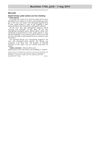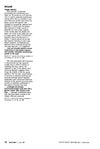Search
for
Sort by
Research
480-510 / 1000+ results
research Oral Signs of Hematologic Disease
The conclusion is that different blood diseases cause specific oral symptoms and require varied treatments to manage these symptoms and improve patient health.

research Evaluation of the Safety and Effectiveness of Oral Minoxidil in Children: A Systematic Review
Low-dose oral minoxidil is safe for treating children's hair disorders.

research Correction: Oral Minoxidil Therapy in Hair Loss: Where Do We Stand?
Oral minoxidil is a potential treatment for hair loss.

research Oral Minoxidil Therapy in Hair Loss: Where Do We Stand?
Oral minoxidil is effective for various hair loss types and may improve male sexual function, but aspirin can reduce its effectiveness.

research Retrospective Review of Oral and Topical Minoxidil for Cancer Treatment-Induced Hair Loss
Minoxidil may help with hair loss caused by cancer treatments.

research 28-Year-Old Female with Diffuse Thinning of the Scalp After Isotretinoin and Oral Contraceptives
Some hair loss from medication may reverse after stopping the drug, but treatment options are limited and ongoing research is needed.

research Traditional Anticoagulants and Hair Loss: A Role for Direct Oral Anticoagulants? A Review of the Literature
Some new oral anticoagulants may also cause hair loss and might not be better than traditional ones for preventing hair loss.

research Comparative Analysis of Low-Dose Oral Minoxidil with Spironolactone Versus Finasteride or Dutasteride in Female Androgenetic Alopecia Management
Both treatment combinations improved hair growth similarly and were safe.

research Assessing Low-Dose Oral Minoxidil Efficacy in Androgenetic Alopecia: A Comparative Study of AGA and AGA Unmasked by Telogen Effluvium
Low-dose oral minoxidil is effective and safe for treating androgenetic alopecia.

research Combination of Low-Dose Isotretinoin and Pulsed Oral Azithromycin in the Management of Moderate to Severe Acne
Low-dose isotretinoin combined with pulsed azithromycin cleared acne in most patients, with mild side effects.

research Randomized Questionnaire-Based Case-Control Research Study on Evaluation of Sexual Function in Indian Patients Taking Oral Finasteride for Androgenetic Alopecia
Finasteride doesn't negatively affect sexual function in Indian men with hair loss.

research Integrated Safety Analysis of Ritlecitinib, an Oral JAK3/TEC Family Kinase Inhibitor, for the Treatment of Alopecia Areata from the ALLEGRO Clinical Trial Program
Ritlecitinib is safe and well-tolerated for treating alopecia areata in patients aged 12 and older.
research Folliculotropic CD8+ Mycosis Fungoides Associated with Diffuse Mucosal Involvement
A rare type of skin cancer with mucosal involvement was partially treated but eventually relapsed.

research Female Androgenetic Alopecia: An Update on Diagnosis and Management
FAGA diagnosis uses blood tests and trichoscopy, with treatments like topical minoxidil, oral anti-androgens, and hormone-modulating drugs.

research Effectiveness of Ethinylestradiol/Chlormadinone Acetate in Treating Dermatological Conditions Related to High Androgen Levels
The oral contraceptive ethinylestradiol/chlormadinone acetate is effective in reducing acne and improving other skin conditions related to high androgen levels.
research Anti-Androgens
Effective treatments for excessive body hair in women include drugs that block androgens, sometimes combined with oral contraceptives.

research Minoxidil
Oral minoxidil for hair loss caused mild side effects in some men, but most continued treatment.

research Minoxidil
Oral minoxidil may slow male pattern baldness and cause body hair growth, but hair loss can happen after stopping it.

research 63-Year-Old Female with Diffuse Thinning of the Hair
Androgenetic alopecia, a common hair loss condition, can be treated with topical minoxidil, oral finasteride, or oral spironolactone, and new treatments like platelet-rich plasma, low-level laser therapy, and janus-kinase inhibitors are being explored.

research Androgenetic Alopecia: An Evidence-Based Treatment Update
Effective treatments for male pattern baldness include oral finasteride and topical minoxidil, while topical minoxidil is best for female pattern baldness.
research An Infectious Scalp Disorder: A Case of Gray Patch Tinea Capitis in a 7-Year-Old Girl
A 7-year-old girl's scalp infection was cured with oral medication and medicated shampoo.

research A Phase I, Open-Label, Sequential, Single-Dose Clinical Trial to Evaluate the Pharmacokinetics, Pharmacodynamics, and Safety of IVL3001, a Finasteride-Based Novel Long-Acting Injection for Androgenetic Alopecia
IVL3001 is safe, effective, and better than oral finasteride for treating hair loss.

research Alpha-Hydroxy Acid-Based Cosmetic Procedures
Alpha-hydroxy acids, like glycolic acid, safely improve skin issues and work on all skin types.

research Acne
Hormonal treatments can help with acne, especially in women, by lowering androgen levels or blocking their effects.

research Dermatologic Manifestations of Polycystic Ovary Syndrome
Women with PCOS often have skin problems like excessive hair, acne, hair loss, and dark patches, which can be treated with hormonal and non-hormonal therapies.

research Alopecia Areata: An Evidence-Based Treatment Update
Some treatments, like corticosteroids and sensitizing agents, can help with alopecia areata, but more high-quality research is needed.

research Treatments for Androgenetic Alopecia and Alopecia Areata
Minoxidil and finasteride treat hair loss; more research needed for other options.

research Pediatric Tinea Capitis: Rising Incidence and Treatment
Children with scalp fungal infections need proper diagnosis and treatment, usually with antifungal medications, and newer drugs may offer quicker recovery.

research Folliculitis
Folliculitis is an inflammation of hair follicles that requires proper diagnosis and treatment based on the specific cause.